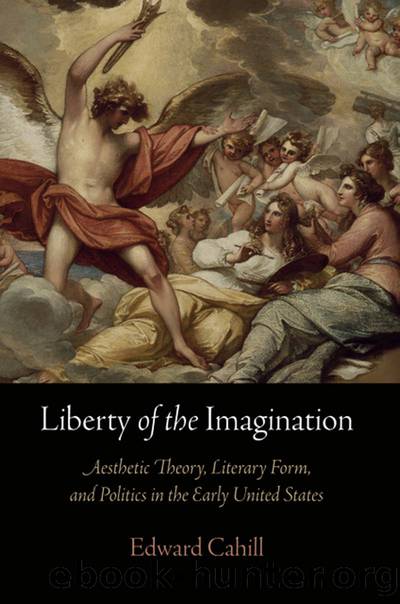Liberty of the Imagination by Cahill Edward;

Author:Cahill, Edward;
Language: eng
Format: epub
Publisher: University of Pennsylvania Press
Published: 2012-08-15T00:00:00+00:00
Publius and the Problem of Representation
Both before and after the Revolution, political representation was a widely contested question, particularly in Britain, where radical Whigs earlier in the century had challenged the constitutional theory of virtual representation, through which Parliament indirectly represented the âcommonsâ of the entire nation. Such representation, they claimed, was a mere abstraction; the represented will of the people never assured the pursuit of their interests or implied the possibility of their intervention. In the same way, as Bernard Bailyn has demonstrated, American colonists, who had traditionally instructed local representatives on questions of government policy, refused to believe that their interests were represented in Parliament.66 As a result, when they considered the nature and function of representation for their own governments, they insisted on a less mediated distance between constituents and their representatives. But what kind of mediation and how much distance were among the most difficult questions faced by the Convention. None caused more disagreement and frustration, and most delegates understood that resolving these questions effectively was their most important responsibility. Anti-Federalist Edmund Randolph warns that âif a fair representation of the people be not secured, the injustice of the Govt. will shake it to its foundations.â67 Wilson, his opponent on many other matters, concurs: âA vice in the Representation, like an error in the first concoction, must be followed by disease, convulsions, and finally death itself.â68 As they debated the purpose of representation, the frequency of popular elections, and the size and shape of the federal legislature, they struggledâeven within their own alliancesâto find consensus. The question of African slaves created perhaps the most persistent and passionate disagreement, but it was in many ways emblematic of the debate and its outcome. While the final determination to let one slave represent three-fifths of a citizen was morally incoherent, like most of the Conventionâs provisions on representation it was a compromise, reflecting the reality that, under most state laws, slaves were both human beings and property.
The Constitutionâs scheme of representation, based on a periodically elected bicameral legislature of citizens, was also a compromise. As Madison insists in Federalist 55, because it derives from the âgenius of the people of Americaâ (344), it reflects both a âcertain portion of esteem and confidenceâ in their social passions and a âcertain degree of circumspection and distrustâ concerning their selfish ones (346). The idea of âgeniusâ here refers not to heightened imaginative ability but the essential spirit of a political community. But it implies an economy of the passions in which private and public interests are in tension with each other. Madison assumes that through representation such a tension would be transformed and channeled into what in Federalist 10 he calls a âpublic voice, pronounced by the representatives of the people.â This process would ârefine and enlarge the public views by passing them through the medium of a chosen body of citizens.â As the selfish passions of the people are filtered through the judgments of its representatives, such a voice would become âmore consonant to the public good than if pronounced by the people themselvesâ (82).
Download
This site does not store any files on its server. We only index and link to content provided by other sites. Please contact the content providers to delete copyright contents if any and email us, we'll remove relevant links or contents immediately.
The Power of Myth by Joseph Campbell & Bill Moyers(940)
Half Moon Bay by Jonathan Kellerman & Jesse Kellerman(921)
A Social History of the Media by Peter Burke & Peter Burke(888)
Inseparable by Emma Donoghue(855)
The Nets of Modernism: Henry James, Virginia Woolf, James Joyce, and Sigmund Freud by Maud Ellmann(773)
The Spike by Mark Humphries;(730)
A Theory of Narrative Drawing by Simon Grennan(717)
The Complete Correspondence 1928-1940 by Theodor W. Adorno & Walter Benjamin(713)
Ideology by Eagleton Terry;(666)
Bodies from the Library 3 by Tony Medawar(657)
World Philology by(650)
Culture by Terry Eagleton(649)
Farnsworth's Classical English Rhetoric by Ward Farnsworth(648)
Adam Smith by Jonathan Conlin(620)
A Reader’s Companion to J. D. Salinger’s The Catcher in the Rye by Peter Beidler(617)
Game of Thrones and Philosophy by William Irwin(604)
High Albania by M. Edith Durham(599)
Comic Genius: Portraits of Funny People by(588)
Monkey King by Wu Cheng'en(583)
